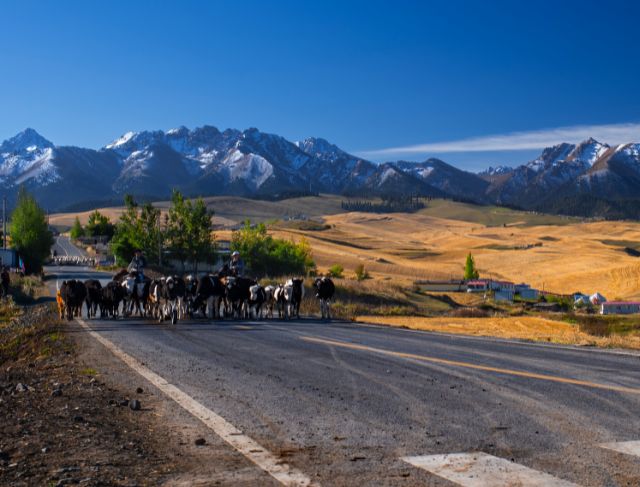Let us be clear: there was nothing glamorous about the “adventure”. It concluded with us slumped over in some bus after fourteen consecutive hours of police stops, luggage searches, and apparently endless passport scans. Every new checkpoint felt like deja vu—faces scanned, documents photographed, sometimes by guys who weren’t even in uniform. Kashgar appeared after midnight, but we no longer could muster an excitement to celebrate.
Do Not Expect Grapes–Expect Suspicion
Crossing Xinjiang feels like being in a movie, where all of the extras have guns, and all of the cameras are pointed at you. Upon crossing the border, the guards lumbered me into a side room, flipped through my SD cards, searched through my laptop, and asked me pleasant little questions like, “Oh, are you a journalist? Will you be speaking to anyone?” When I attempted to smile, one officer leaned in close to me and said, “We are watching you.” Not grapes. Surveillance.
An Unusual Start
The story didn’t quite get underway with checkpoints—it got underway with hitchhiking. We used “female privilege” (their words, not mine) to push through guards and into a quasi no-man’s-land filled with buzzing trucks, and no one even knew if the border was open. Our driver dropped us off on the ice road, picked up some cargo, and left us to contemplate the empty gates of China. The scene was filled with refugees, rumors, and rifles. No one could tell us if today was the day to cross.
Comedy or Tragedy? A Little of Both
Imagine this: arriving in a “hotel” that looked like it was from a horror movie, toilets that could scare any strong stomach, and a heater made out of a functioning car radiator strapped to a stove. At one point, I jokingly said we could be in Fallout 5: Kyrgyzstan Edition. French fries were the only safe meal. Anything else was a gamble with food poisoning in a place where a doctor would take days to get to.
Refuge in Watermelon and Cigarettes
Hospitality, on the other hand, arose in the most unusual ways. Someone we barely knew invited us inside and offered us watermelon. They carved it for us and slid dumplings across the tabletop of the rough wood. In another place, someone handed us cigarettes and lit them for us as if it was done with solemn dignified intent. Through the rain, cold winds, and all of our suspicions, these small kindnesses felt like five-star hospitality. We ate, laughed, and forgot for ten minutes the next checkpoint might change everything we were trying to do.
The Middle That Should Have Been the Start
Xinjiang itself is fantastical. Streets are lined with barbed wire surrounding schools, each street corner has a watchtower, and signs are displayed in three languages—Chinese, Uyghurs with an Arabic script, and English translations that seemed inserted for good measure. On paper, it all states that there is “cultural coexistence.” But what it feels like is walls. And as the bus pushed along the highway deeper into the province, one “school” was enveloped in razor wire and we lost what little optimism we had left.
When Hitchhiking Became a Social Experiment
With our thumbs out in the middle of nowhere we received a sociology lesson. Some vehicles barreled past to avoid us. Others stopped and let us load up their cars, introduced themselves as Texans, Afghans, or veterans with gear in their trunks. One man was gleefully displaying helmets, vests, and even pre-workout supplement powder as if he were showing pictures of family. One babushka even greeted us with “Hello, America!” (nascent confirmation that there were still some forms of hospitality in these small, frozen communities).
Back to the Border
Eventually, we reached the legitimate Chinese border. The antithesis to the chaos we had just completed was state-run public transport, orderliness, and a faintly sterile efficiency. Shared buses moved us across the desert in many miles or so, while guards consistently scanned our faces for no reasons. Racism surfaced too. Some of the drivers would mutter that foreigners could only ride if all the seating in the Chinese seats were filled. Part of the time spent waiting and part agreeing to the insults was another performance that became its own activity.
And so, after thirty-six hours of purgatory, dozens of “no photos!” alerts, watermelon parties, and seemingly endless checkpoints, we arrived in Kashgar. Relief was cigarette cheap and while I sat on a dusty bus seat I thought, “would I do this whole thing again?” Probably not. Would I erase the chaos, paranoia, and random acts of kindness for something more smooth? Also no. While the border crossing was grueling, it was an unforgettable memory.




